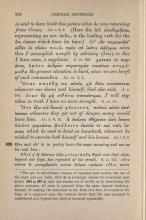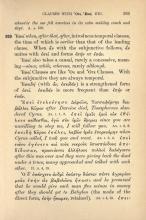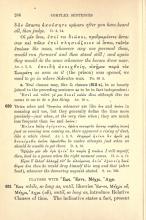627. Ὅτε (while, when), and Ὁπότε (whenever, § 236), introduce temporal clauses, the time of which is commonly the same as that of the leading verb. When ἄν with the subjunctive follows, ἄν is joined to the conjunction; ὅτε ἄν becomes ὅταν, ὁπότε ἄν becomes ὁπόταν.
Ὅτε and Ὁπότε, like when, since, while[fn]Lat. cum has like changes of meaning; but the Greek use of modes must not be confused with the Latin.[/fn] often take a causal meaning; rarely they take a concessive meaning, although. Ὅτε and Ὁπότε clauses are like Ὅς and Ὅστις clauses. With the subjunctive they are always temporal.
Ὅτε ταῦτα ἦν, σχεδὸν μέσαι ἦσαν νύκτες.
It was about midnight when this was taking place.
Xen. Anabasis 3.1.33
ἐνταῦθα Ξέρξης, ὅτε ἐκ τῆς Ἑλλάδος ἀπεχώρει, λέγεται οἰκοδομῆσαι ταῦτα τὰ βασίλεια.
There Xerxes is said to have built this palace when he was returning from Greece.
Xen. Anabasis 1.2.9
(Here the infinitive οἰκοδομῆσαι, representing an aorist indicative, is the leading verb for the ὅτε clause which fixes its time.)
ὅτʼ οὗν παραινοῦσʼ οὐδὲν ἐς πλέον ποιῶ, πρὸς σὲ ἱκέτις ἀφῖγμαι.
Since then I accomplish naught by advising (him), to thee I have come, a suppliant.
Soph. Oedipus the King 918–920
χαλεπὰ τὰ παρόντα, ὁπότε ἀνδρῶν στρατηγῶν τοιούτων στερόμεθα.
The present situation is hard, since we are bereft of such commanders.
Xen. Anabsais 3.2.2
Ὅταν σπεύδῃ τις αὐτός, χὠ θεὸς συνάπτεται.
Whenever one shows zeal himself, God also aids.
Aesch. Persians 742
ὅταν δὴ μὴ σθένω πεπαύσομαι.
I will stop when in truth l have no more strength.
Soph. Antigone 91
Ὅτε ἔξω τοῦ δεινοῦ γένοιντο,[fn]The optative in subordinate clauses of repeated past action, the use of the imperfect and aorist indicative with ἂν in principal clauses for occasional past action (§§ 361.a, 367.a), and our similar use of would, as in translating the above sentence, all seem to proceed from the same mental tendency. Instead of making the statement in the form of a fact, it is made in the form of a supposed case; the context shows that the case assumed is understood as a typical one, such as occurred repeatedly.[/fn] πολλοὶ αὐτὸν ἀπέλειπον.
Whenever they got out of danger, many would leave him.
Xen. Anabasis 2.6.12
ἅ ἐκεῖνος ἐθήρευεν ἀπὸ ἵππου ὁπότε γυμνάσαι βούλοιτο ἑαυτόν τε καὶ τοὺς ἵππους
which he used to hunt on horseback, whenever he wished to excercise both himself and his horses.
Xen. Anabasis 1.2.7
628. Εὖτε and εὖτʼ ἄν in poetry have the same meaning and use as ὅτε and ὅταν.
Εὖτέ γʼ ἐξ ἀέλπτων Aἴᾱς μετεγνώσθη θῡμοῦ
now that Aias, beyond our hope, has repented of his wrath
Soph. Ajax 715–717
εὖτε πόντος ἐν μεσημβριναῖς κοίταις ἀκῡ́μων νηνέμοις εὕδοι πεσών
whenever the sea fell waveless in its calm midday couch and slept
Aesch. Agamemnon 565–566
629. Ἐπεί (when, after that, after), introduces temporal clauses, the time of which is earlier than that of the leading clause. When ἄν with the subjunctive follows, ἄν unites with ἐπεί and forms ἐπήν or ἐπν. Ἐπεί also takes a causal, rarely a concessive, meaning—since, while, whereas, rarely although.
Ἐπεί clauses are like Ὅς and ὅτε clauses. With the subjunctive they are always temporal. Ἐπειδή (with ἄν, ἐπειδν) is a strengthened form of ἐπεί. ἐπειδν is more frequent than ἐπήν or ἐπᾱ́ν.
Ἐπεὶ ἐτελεύτησε Δᾱρεῖος, Tισσαφέρνης διαβάλλει Κῦρον.
After Dareios died, Tissapheres slandered Cyrus.
Xen. Anabasis 1.1.3
ἐπεὶ ῡ̔μεῖς ἐμοὶ οὐκ ἐθελετε πείθεσθαι, ἐγὼ σὺν ῡ̔μῖν ἕψομαι.
Since you are unwilling to obey me, I will follow you.
Xen. Anabasis 1.3.6
ἐπειδὴ Κῦρος ἐκάλει, λαβὼν ῡ̔μᾶς ἐπορευόμην.
When Cyrus called, I took you and went.
Xen. Anabasis 1.3.4
ἐπεὶ τοῦτο ἐγένετο καὶ τοὺς νεκροὺς ὑποσπόνδους ἀπεδίδοσαν, προσιόντες ἀλλήλους πολλοὶ διελέγοντο.
After this was over and they were giving back the dead under a truce, many approached and talked with each other.
Xen. Hellenica 2.4.19
Ὁ δʼ ὑπέσχετο ἀνδρὶ ἑκάστῳ δώσειν πέντε ἀγρυρίου μνᾶς ἐπὴν εἰς βαβυλῶνα ἥκωσι.
And he promised that he would give each man five minae in money after they should get to Babylon (the mode of the direct form, ἐπὴν ἥκωμεν, retained).
Xen. Anabasis 1.4.13
ἐπειδᾱ̀ν ἅπαντα ἀκούσητε κρῑ́νατε.
After you have heard all, then judge.
Demosthenes 4.14
Οἱ μὲν ὄνοι, ἐπεί τις διὥκοι, προδραμόντες ἕστασαν καὶ πάλιν ἐπεὶ πλησιάζοιεν οἱ ἵπποι, ταὐτὸν ἐποίουν.
The asses, whenever any one pursued them, would run forward and then stand still; and again they would do the same whenever the horses drew near.
Xen. Anabasis 1.5.2
ἐπειδὴ ἀνοιχθείη, εἰσῇμεν παρὰ τὸν Σωκράτη.
As soon as it (the prison) was opened, we used to go in where Sokrates was.
Plato Phaedo 59d
a. Ἐπεί clauses may, like ὅς clauses (§ 612.a), be so loosely joined to the preceding sentence as to be in fact independent.
Ἐπεὶ καὶ τοῦτό γέ μοι δοκεῖ καλὸν εἶναι.
Although this too seems to me to be a fine thing.
Plato Apology 19e
630. Ἡνίκα (when) and Ὁπηνίκα (whenever) are like ὅτε and ὁπότε in meaning and use, but they generally define the time more precisely—just when, at the very time when; they are much less frequent than ὅτε and ὁπότε.
Ἡνίκα δείλη ἐγίγνετο, ἐφάνη κονιορτὸς ὥσπερ νεφέλη λευκή.
Just as evening was coming on, there appeared a rising of dust, like a white cloud.
Xen. Anabasis 1.8.8
ἐπιχειρεῖ ἡνίκα ἂν ἡμεῖς μὴ δυναίμεθα ἐκεῖσε ἀφικέσθαι.
He makes attempts just when we should be unable to get there.
Demosthenes 4.31
Ἐξάρξω μὲν οὖν ἐγὼ ἡνίκʼ ἂν καιρὸς ᾖ παιᾶνα.
I will myself, then, lead in a paean when the right moment comes.
Xen. Hellenica 2.4.17
Εἶρπε δʼ ἄλλοτʼ ἀλλαχᾷ τότʼ ἂν εἰλυόμενος, ἁνίκʼ ἐξανείη δακέθῦμος ἄτᾱ.
Then he would drag himself this way and that (after food), whenever the devouring anguish abated.
Soph. Philoctetes 705




